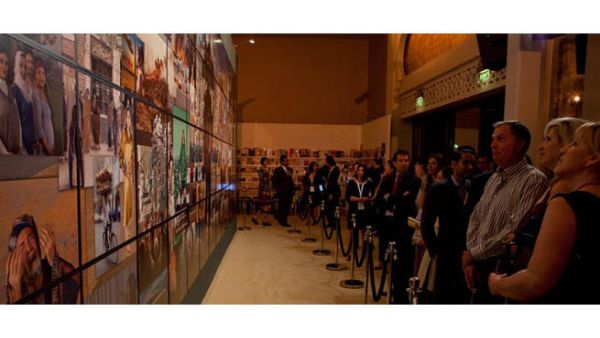Five young artists from Morocco to India have been named the winners of the sixth annual Abraaj Group Art Prize, organizers announced Tuesday. Established in 2008 by the Dubai-based private equity firm, which absorbs all of the winning works into its corporate collection, the prize is unique in that it selects proposals, rather than completed works, and awards a handsome sum of $100,000 to each artist for the purpose of realizing their project.
Abraaj is also unique in its self-styled emphasis on a region defined as MENASA (the Middle East, North Africa and South Asia). That description may keep the award focused on the biographies and personal histories of its chosen artists, yet all of this year’s winners span far more complex geographies in their day-to-day lives, to say nothing of the lines of thought emanating from their works, which more often than not question, challenge and double back on precisely these same categories.
Bouchra al-Khalili, for example, is a Casablanca-born, Berlin-based artist whose videos, installations and formalist works on paper delve into the often-clandestine migrations of bodies (and with them stories, ideas, arguments and beliefs) across numerous seas, cities and territories. Her most-recent projects, including the video installation “Words on Streets” (2013) for the main exhibition at the current Venice Biennale, explore the voices of migrants, whether telling their own stories or reciting the speeches of famous liberation movements.
Basim Magdy, meanwhile, is an Egyptian artist living in Switzerland whose films and drawings play with the elusive yet humorous relationships that can be forged between words, images and associations in between. Two of his videos were featured in Beirut’s recent Home Works Forum.
Kamrooz Aram is a New York-based painter from Iran whose bold, large-scale canvases delve into histories of abstraction, modernity, ornament and décor. Abbas Akhavan, also from Iran, is currently based in Toronto and specializes in installations that twine monumental gestures around an impressive simplicity of means (planting a forest in the grand hall of a former state-run printing press, for example).
Anup Mathew Thomas, who lives and works in Bangalore, gave the inaugural Kochi-Muziris Biennale one its most enduring projects – a series of riveting photographs paired with Borges-esque stories all grappling, in one way or another, with death.
“I’m really pleased with the list,” said Nada Raza, the guest curator for Abraaj’s 2014 edition of the prize. Following the efforts of Murtaza Vali in 2013, and Nat Muller in 2012, Raza was appointed to the position in May. “Each project is very well thought out and shows real maturity in their practice. Each of the artists in their practice is highly evolved.”
“What’s interesting,” she added, ducking out a meeting during her day job at Tate Modern in London, “is the sheer ambition of each project. I think that’s what has come to distinguish the prize, the incredible opportunity for the production of works that artists wouldn’t be able to realize on their own. The challenge for me is to make these works accessible without diluting them.”
Abraaj is famously secretive about the nine-month process, when the winning projects are works in progress. This allows the prize to build suspense (and expectations) ahead of the unveiling, which occurs every year in the form of an exhibition housed within the art fair Art Dubai. That said, Raza was willing to make a few claims for the group.
As to whether or not she intended to introduce any major structural changes to the way the prize-winning works will be presented, Raza was firm without giving anything away.
“It will be totally different,” she said, “but I don’t have anything nailed down to speak about yet. The process of this particular prize is so interesting and unlike other curatorial projects where you go out and select the artists. I want to make the curatorial process much more transparent, because it’s much more about translating ideas. You play that role very actively. I want to make that apparent.”
For more information about the Abraaj Group Art Prize, please see www.abraajgroupartprize.com







